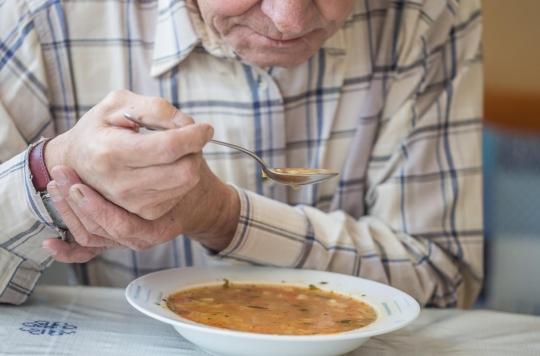Affecting 2 million people in France, dysphagia is a still poorly diagnosed disorder that degrades swallowing abilities. What are the symptoms, causes and treatments of this disease which can lead to malnutrition, dehydration or airway obstruction?

- Still poorly detected, dysphagia affects more than 2 million people in France.
- This eating disorder results in discomfort or pain when swallowing and can cause undernutrition and dehydration.
Having great difficulty swallowing certain foods and drinks, sometimes even a simple glass of water. This disorder has a name: dysphagia.
Still poorly understood and little diagnosed, this swallowing disorder affects more than 2 million people in France, of all ages, even if the elderly, those who have suffered a cerebrovascular accident (CVA), suffering from Alzheimer’s disease or Parkinson’s disease are considered more at risk. This pathology degrades the swallowing abilities of those affected and partially or totally deprives them of their ability to eat or drink in the traditional way. Their way of feeding and hydrating needs to be reinvented in order to avoid underlying problems such as malnutrition, dehydration, obstruction of the airways or even aspiration pneumonia.
What are the symptoms of dysphagia?
Dysphagia results in a feeling of discomfort or pain when passing food and/or drink through the larynx and esophagus. It can cause retching, coughing or a feeling of choking when swallowing. It can also give the sensation of food sticking in the throat or making food go wrong. Difficulty starting to swallow, pain when swallowing, excessive salivation are also symptoms of dysphagia.
What are the causes of dysphagia?
If this difficulty in swallowing can be occasional, for example in the event of angina or pharyngitis, it can appear from birth. But, in most cases, dysphagia appears in the elderly and is then linked to an aging of the larynx. A stroke can also be the cause of dysphagia, as well as a neurodegenerative disease such as Alzheimer’s and Parkinson’s, which damage the mechanism of closure of the airways. This is called oropharyngeal dysphagia, which corresponds to the difficulty in initiating swallowing and propelling food towards the esophagus. There is also esophageal dysphagia: this time, the feeling of blockage and discomfort is felt lower in the chest.
What are the consequences of dysphagia?
Swallowing difficulties can be accompanied by malnutrition, dehydration, weight loss. They can also cause regurgitation, vomiting, obstruction of the airways which can lead to death by suffocation. There is also a significant risk of aspiration pneumonia if food residue passes through the respiratory tract.
Dysphagia also has consequences on social life. “When this natural and cultural function can no longer be done safely, the patient experiences the painful experience of physical and social handicap, thus explains Michel Guatterie, masseur-physiotherapist and expert in swallowing disorders. The meal thus becomes a difficult ordeal to share as it can be painful to swallow, embarrassing to cough with each bite and risk of choking.
What treatment for dysphagia?
Pain, discomfort, a feeling of chest tightness and/or regular or systematic suffocation are warning signs that should lead to the consultation of a doctor when these persist. The identification of the causes and the diagnosis then require a multidisciplinary collaboration involving a gastroenterologist, a neurologist, an ENT specialist or even a geriatrician. It is also possible to consult a speech therapist to carry out complete swallowing assessments.
In some cases, dysphagia requires surgery to widen the lumen of the esophagus. “Apart from the surgical act, rehabilitation methods will help the patient, when possible, to recover all or part of his capacities, or quite simply to set up postures or practices which will facilitate the delicate stage of swallowing. In each of these cases, this support must be coupled with a nutritional adaptation.explains Lucie Borjon, Dysphagia expert for the agri-food group Nutrisens.
“The care being multidisciplinary, other paramedical professionals such as physiotherapists, occupational therapists or even nurses who have undergone specific training in swallowing disorders can also intervene with the subjects concerned”she concludes.
.















